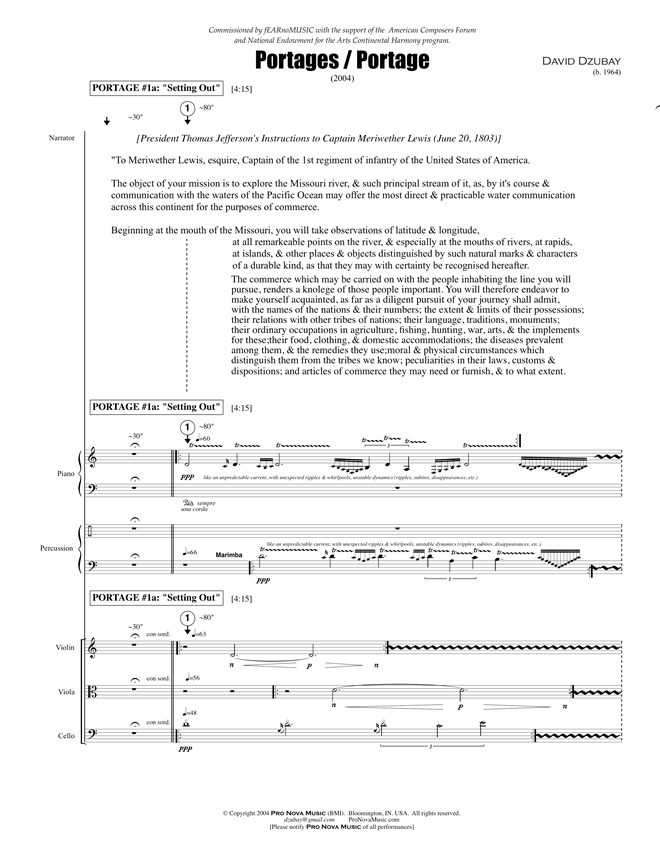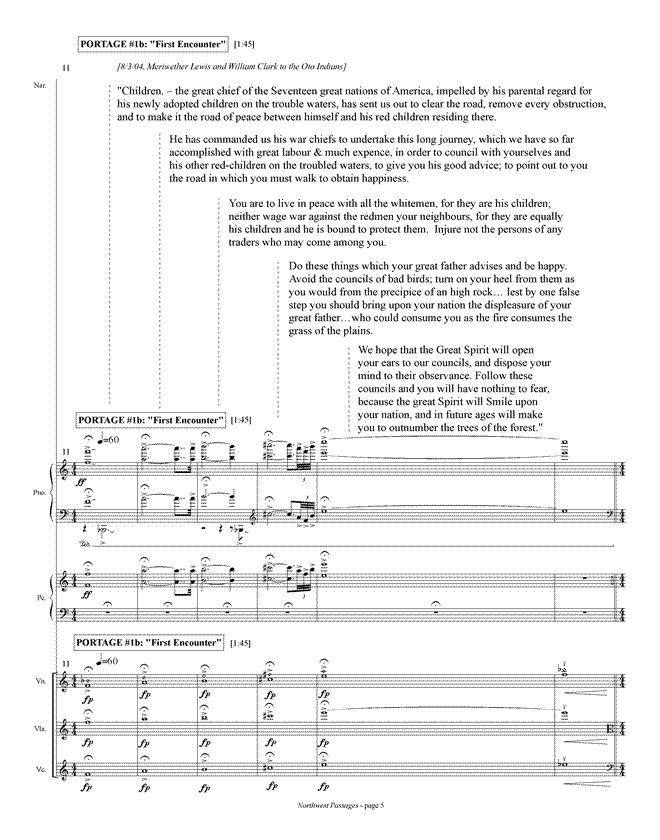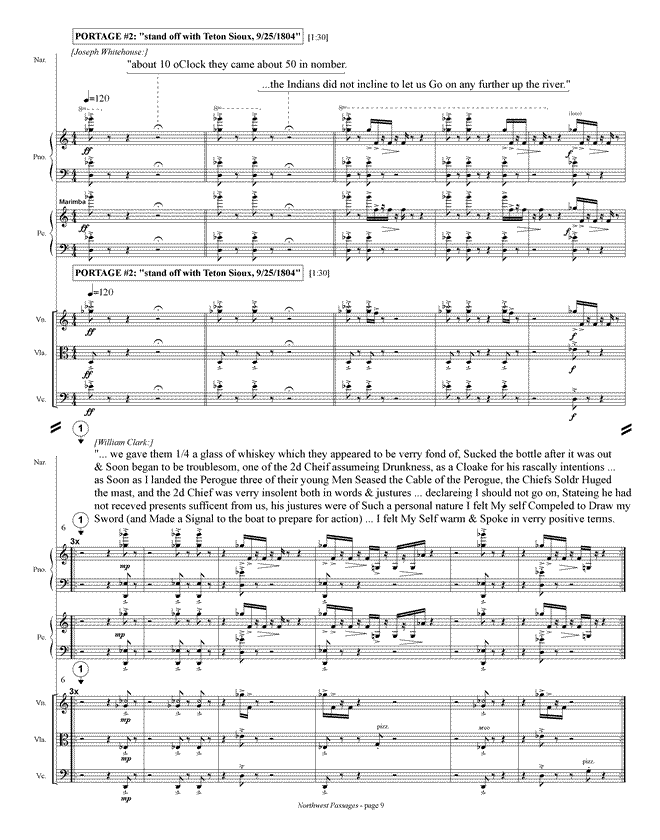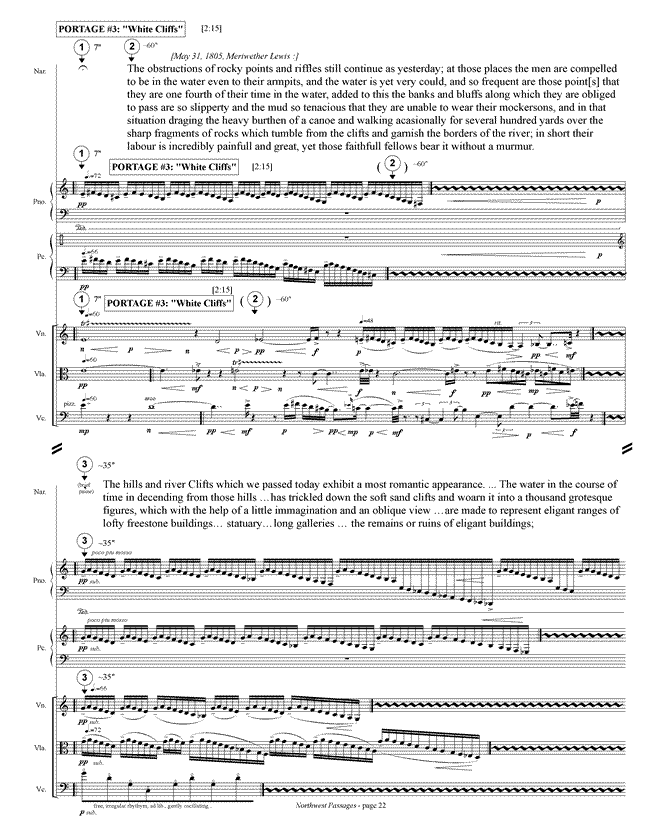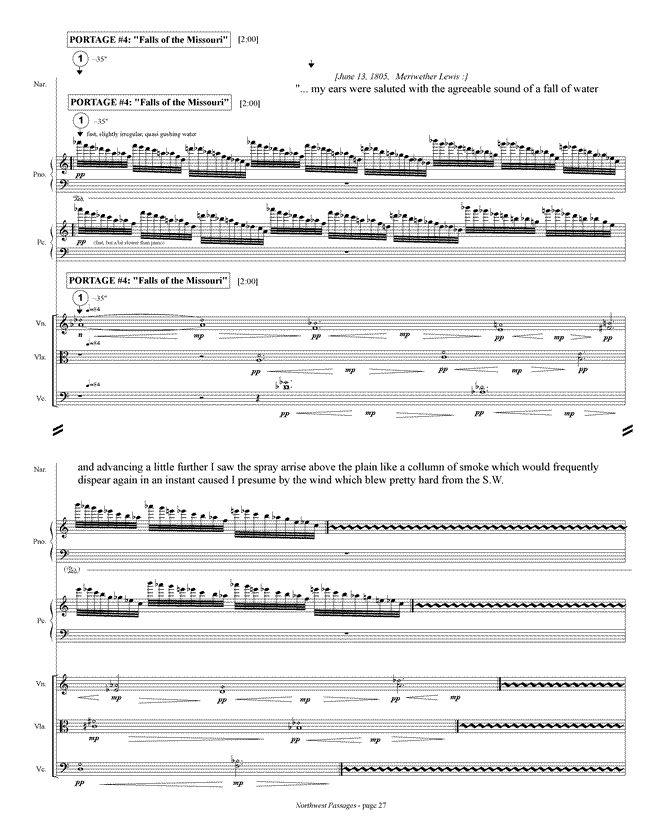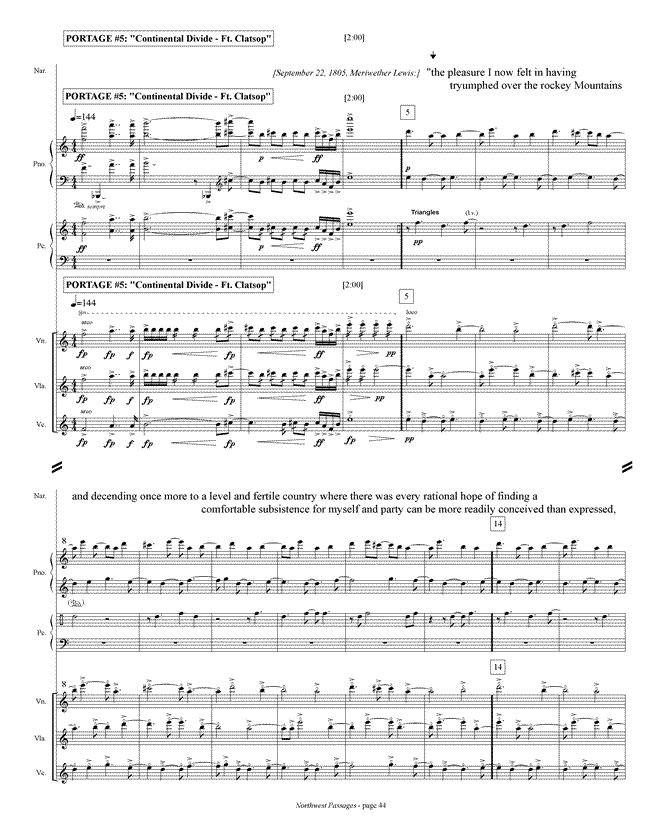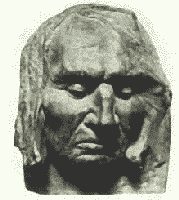Portage / Portages
(2004) for for Piano, Percussion, Violin, Viola, and Cello and optional Narrator
PORTAGE #1a |
"Setting Out” |
Instrumentation:
Chorus (SATB), Narrator, Piano, Percussion*, Violin+, Viola+, Cello+
* Marimba, 2 Tam-tams, Bass Drum, 2 triangles, miscellaneous bells (triangles, bell tree, crotales, finger cymbals, etc.) to be shared with strings.
+ doubling assorted small bells in Song #5
duration: 11 or 13 minutes
premiere: March 12, 2004, fEARnoMUSIC, in collaboration with The Portland State University Chamber Choir, Bruce Browne, Director; David Dzubay, conductor.
live audio from premiere:
PORTAGE #1a
PORTAGE #1b
PORTAGE #2
PORTAGE #3
PORTAGE #4
PORTAGE #5
Perusal Score
Score Samples
Continental Harmony links communities with composers through the creation of original musical works. The program is a partnership of American Composers Forum and the National Endowment for the Arts, with additional funds provided by the John S. & James L. Knight Foundation, Rockefeller Foundation, and from Marshall Field's Project Imagine with support from the Target Foundation. Commissioned by fEARnoMUSIC, Philip Hansen, Artistic Director.
Program Note
Northwest Passages presents two compositions in parallel. One of these, a series of five movements for instruments and narrator, follows the western course of the Lewis and Clark Expedition, beginning at the departure from Saint Louis in May 1804 and ending with the arrival at the Pacific Ocean in November 1805. The narrator recites excerpts from the Corps of Discovery's journals, focusing on a few landmark events from the journey. In the score, these movements are called 'portages,' as they serve to link from one to the next of five choral songs comprising the other composition, which in fact can be performed alone under the title Five Dream Songs. The songs are settings of Native American song texts, and present a counterpoint to the narrative of the expedition. Alongside the songs the narrator recites excerpts from Chief Seattle's oft-repeated speech of 1854, creating another counterpoint in this work representing in some way a passage of two peoples.
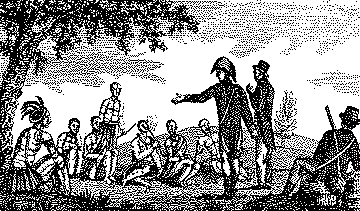
Performance Notes
Narration: The narrator should have a powerful presence, and speak with two different tones, rather quick and enthusiastic for the journals, and slower, more peacefully resigned for Chief Seattle's text. The narrator must be amplified.
Performance Options:
1. COMPLETE. (with narration, 5 instruments)
2. SONGS ONLY, with the title, Five Dream Songs.
a) CHORUS, NARRATOR, ALL 5 INSTRUMENTS (Duration: 20 minutes)
b) CHORUS, NARRATOR, PIANO . (All songs)
c) CHORUS, PIANO . (All songs. Someone from chorus narrating in Song #5)
d) A CAPELLA CHORUS. (Songs 1, 3, 5. Duration: 10 minutes)
3. PORTAGES ONLY
a) Instruments only, in 1 movement, with the title Portage. (Duration: 11 minutes)
The cuts are indicated in the score in this manner: X: to P3
b) Instruments and Narration, with the title Portages. (Duration: 13 minutes)
Add P2 to above (before P3). Leave out narration on p. 47.
TEXTS in the "Portages"
From the journals of the Lewis and Clark Expedition, 1804-1806:
PORTAGE #1a "Setting Out"
[from President Thomas Jefferson's Instructions to Captain Meriwether Lewis (June 20, 1803):] "To Meriwether Lewis, esquire, Captain of the 1st regiment of infantry of the United States of America. The object of your mission is to explore the Missouri river, & such principal stream of it, as, by it's course & communication with the waters of the Pacific Ocean may offer the most direct & practicable water communication across this continent for the purposes of commerce. Beginning at the mouth of the Missouri, you will take observations of latitude & longitude, at all remarkeable points on the river, & especially at the mouths of rivers, at rapids, at islands, & other places & objects distinguished by such natural marks & characters of a durable kind, as that they may with certainty be recognised hereafter. The commerce which may be carried on with the people inhabiting the line you will pursue, renders a knolege of those people important. You will therefore endeavor to make yourself acquainted, as far as a diligent pursuit of your journey shall admit, with the names of the nations & their numbers; the extent & limits of their possessions; their relations with other tribes of nations; their language, traditions, monuments;their ordinary occupations in agriculture, fishing, hunting, war, arts, & the implements for these;their food, clothing, & domestic accommodations; the diseases prevalent among them, & the remedies they use;moral & physical circumstances which distinguish them from the tribes we know; peculiarities in their laws, customs & dispositions; and articles of commerce they may need or furnish, & to what extent. And, considering the interest which every nation has in extending & strengthening the authority of reason & justice among the people around them, it will be useful to acquire what knolege you can of the state of morality, religion, & information among them; as it may better enable those who endeavor to civilize & instruct them, to adapt their measure to the existing notions & practices of those on whom they are to operate. In all your intercourse with the natives, treat them in the most friendly & conciliatory manner which their own conduct will admit; allay all jealousies as to the object of your journey, satisfy them of its innocence, make them acquainted with the position, extent, character, peaceable & commercial dispositions of the U.S. of our wish to be neighborly, friendly & useful to them, & of our dispositions to a commercial intercourse with them; confer with them on the points most convenient as mutual emporiums, and the articles of most desireable interchange for them & us. If a few of their influential chiefs, within practicable distance, wish to visit us, arrange such a visit with them, and furnish them with authority to call on our officers, on their entering the U.S to have them conveyed to this place at the public expense. If any of them should wish to have some of their young people brought up with us, & taught such arts as may be useful to them, we will receive, instruct & take care of them. Such a mission, whether of influential chiefs or of young people, would give some security to your own party. Carry with you some matter of the kinepox; inform those of them with whom you may be, of it'[s] efficacy as a preservative from the small-pox; & instruct & incourage them in the use of it. This may be especially done wherever you winter."
[5/14/04, Patrick Gass] "The corps consisted of forty-three men ... part of the regular troops of the United States, and part engaged for this particular enterprize. The best authenticated accounts informed us, that we were to pass through a country possessed by numerous, powerful and warlike nations of savages, of gigantic stature, fierce, treacherous and cruel; and particularly hostile to white men. And fame had united with tradition in opposing mountains to our course, which human enterprize and exertion would attempt in vain to pass."
[5/14/04, Joseph Whitehouse] "hard Showers of rain. ... we got in readiness. ... we fired our swivel on the bow hoisted Sail and Set out in high Spirits for the western Expedition."
[5/24/04, William Clark] "(A close call on the river. To avoid falling banks, the boat was steered away from the side, rammed onto a sand bar.)
...The Swiftness of the Current Wheeled the boat, Broke our Toe rope, and was nearly over Setting the boat, all hands jumped out on the upper Side and bore on that Side untill the Sand washed from under the boat and Wheeled on the next bank...
(Swimmers took a new rope to the shore, and things were restored to normal) ... This place I call retragrade bend as we were obliged to fall back 2 miles"
[6/19/04, John Ordway] "the water so Swift that we were obledged to hole the Boat by a Rope, we Camped on South Side opposite a poind, which was near to where we camped. The Musquetoes are verry troublesome. Got Musquetoes bears from Capt Lewis to sleep in.
[6/20/04, Joseph Whitehouse] "the Currant was Strong towed Our boat Untill we came to the head of the Strong watter Island whare the watter run so rappid that the men of the french peirouge Could not make headway by Roeing Or poleing the[y] had to jumpd out and push her through the water"
PORTAGE #1b "First Encounter"
[8/3/04, Meriwether Lewis and William Clark to the Oto Indians ]"Children. the great chief of the Seventeen great nations of America, impelled by his parental regard for his newly adopted children on the trouble waters, has sent us out to clear the road, remove every obstruction, and to make it the road of peace between himself and his red children residing there....[He] has commanded us his war chiefs to undertake this long journey, which we have so far accomplished with great labour & much expence, in order to council with yourselves and his other red-children on the troubled waters, to give you his good advice; to point out to you the road in which you must walk to obtain happiness. ...You are to live in peace with all the whitemen, for they are his children; neither wage war against the redmen your neighbours, for they are equally his children and he is bound to protect them. Injure not the persons of any traders who may come among you. ...Do these things which your great father advises and be happy. Avoid the councils of bad birds; turn on your heel from them as you would from the precipice of an high rock... lest by one false step you should bring upon your nation the displeasure of your great father...who could consume you as the fire consumes the grass of the plains. ..We hope that the Great Spirit will open your ears to our councils, and dispose your mind to their observance. Follow these councils and you will have nothing to fear, because the great Spirit will Smile upon your nation, and in future ages will make you to outnumber the trees of the forest."
PORTAGE #2 "Stand off with Teton Sioux"
[9/25/04, Joseph Whitehouse] "about 10 oClock they came about 50 in nomber. ... the Indians did not incline to let us Go on any further up the river.
[9/25/04, William Clark: ] "... we gave them 1/4 a glass of whiskey which they appeared to be verry fond of, Sucked the bottle after it was out & Soon began to be troublesom, one of the 2d Cheif assumeing Drunkness, as a Cloake for his rascally intentions ... as Soon as I landed the Perogue three of their young Men Seased the Cable of the Perogue, the Chiefs Soldr Huged the mast, and the 2d Chief was verry insolent both in words & justures ... declareing I should not go on, Stateing he had not receved presents sufficent from us, his justures were of Such a personal nature I felt My self Compeled to Draw my Sword (and Made a Signal to the boat to prepare for action) ... I felt My Self warm & Spoke in verry positive terms. .. the perogue Soon returned with about 12 of our determined men ready for any event. ... Their treatment to me was verry rough & I think justified roughness on my part, ... I call this Island bad humered Island as were in a bad humer."
PORTAGE #3 "White Cliffs"
[May 31, 1805, Meriwether Lewis] "The obstructions of rocky points and riffles still continue as yesterday; at those places the men are compelled to be in the water even to their armpits, and the water is yet very could, and so frequent are those point[s] that they are one fourth of their time in the water, added to this the banks and bluffs along which they are obliged to pass are so slipperty and the mud so tenacious that they are unable to wear their mockersons, and in that situation draging the heavy burthen of a canoe and walking acasionally for several hundred yards over the sharp fragments of rocks which tumble from the clifts and garnish the borders of the river; in short their labour is incredibly painfull and great, yet those faithfull fellows bear it without a murmur.
The hills and river Clifts which we passed today exhibit a most romantic appearance. ... The water in the course of time in decending from those hills ...has trickled down the soft sand clifts and woarn it into a thousand grotesque figures, which with the help of a little immagination and an oblique view ...are made to represent eligant ranges of lofty freestone buildings... statuary...long galleries ... the remains or ruins of eligant buildings; some collumns standing ...others ...lying prostrate an broken ... nitches and alcoves of various forms and sizes... As we passed on it seemed as if those seens of visionary inchantment would never have and end ...vast ranges of walls of tolerable workmanship, so perfect indeed ...that I should have thought that nature had attempted herre to rival the human art of masonry had I not recollected that she had first began her work."
PORTAGE #4 "Falls of the Missouri"
[June 13, 1805, Meriwether Lewis ] "... my ears were saluted with the agreeable sound of a fall of water and advancing a little further I saw the spray arrise above the plain like a collumn of smoke which would frequently dispear again in an instant caused I presume by the wind which blew pretty hard from the S.W. I did not however loose my direction to this point which soon began to make a roaring too tremendious to be mistaken for any cause short of the great falls of the Missouri. ... to gaze on this sublimely grand specticle ... formes the grandest sight I ever beheld, ... irregular and somewhat projecting rocks below receives the water in it's passage down and brakes it into a perfect white foam which assumes a thousand forms in a moment sometimes flying up in jets of sparkling foam to the hight of fifteen or twenty feet and are scarcely formed before large roling bodies of the same beaten and foaming water is thrown over and conceals them. ... from the reflection of the sun on the sprey or mist which arrises from these falls there is a beatifull rainbow produced which adds not a little to the beauty of this majestically grand senery.... of it's kind I will venture to ascert is second to but one in the known world. My fare is really sumptuous this evening; buffaloe's humps, tongues and marrowbones, fine trout parched meal pepper and salt, and a good appetite; the last is not considered the least of the luxuries."
PORTAGE #5 "Continental Divide - Ft. Clatsop"
[September 22, 1805, Meriwether Lewis] "the pleasure I now felt in having tryumphed over the rockey Mountains and decending once more to a level and fertile country where there was every rational hope of finding a comfortable subsistence for myself and party can be more readily conceived than expressed, nor was the flattering prospect of the final success of the expedition less pleasing. "
[November 07, 1805, William Clark] "Great joy in camp we are in View of the Ocian, this great Pacific Ocean which we been So long anxious to See. and the roreing or noise made by the waves brakeing on the rockey Shores (as I suppose) may be heard distinctly"
[December 01, 1805, William Clark] "The emence Seas and waves ... roars like an emence fall at a distance, and this roaring has continued ever Since our arrival in the neighbourhood of the Sea Coast which has been 24 days Since we arrived in Sight of the Great Western; (for I cannot Say Pacific) Ocian as I have not Seen one pacific day Since my arrival in its vicinity, and its waters are forming and petially [perpetually] breake with emenc waves on the Sands and rockey coasts, tempestous and horiable."


